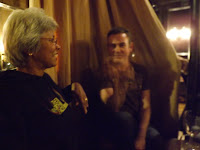So on the theme of free writing, or micro blocking. These are the rules learned from the Screw work let's play people that I'm exploring this month to help make me more creative.
Make a daily appointment with yourself for a set amount of time - I'm trying 20 minutes a day. Use a kitchen timer, or a watch for that period. Stop at the end of 20 minutes. Then write what you plan to do for the following day's microblock, writing down an appoimtment time in your diary. The act of reflecting back adds value, giving you a starting off point the next day, and a reminder of the progress you are making.
What I've been finding is that because I'm freewriting for a short focused period of time this is knocking out my internal critic - the one that nags away with all those negatives about how I can't think of anything to write, or I'm not good enough. There's also a distraction critic who sits around tempting me with cups of tea, other brilliant ideas, bills to be paid, friends to call and email messages to answer. There's no time for any of that. You just go. The video shows an example of a free-writing exercise I had fun with. It's a short story called Ivy.
I'm now using my 40 minute commute to work to edit my novel in the morning and free-write in the afternoon.
Usually at a weekend I sit down to write and can sometimes spend hours at the task. Or not start because domestic stuff gets in the wau. This weekend I decided to schedule my writing time. It feels a bit weird as if I'm still at work.
For the first time in a long time it felt like I was in control of my creativity, instead of being it being in control of me. I began writing at 7 am, and decided to finish by 13.00. Result was that once I'd closed down the laptop I could leave the writing behind with a sense of satisfaction. I'd managed to fit in my writing with the boring tasks like the Sainsburys, and I could concentrate on my family for the rest of the day, and stop feeling guilty. Result!
 |
| 8..10 - 8.30 Editing my novel on the train |
Usually at a weekend I sit down to write and can sometimes spend hours at the task. Or not start because domestic stuff gets in the wau. This weekend I decided to schedule my writing time. It feels a bit weird as if I'm still at work.
For the first time in a long time it felt like I was in control of my creativity, instead of being it being in control of me. I began writing at 7 am, and decided to finish by 13.00. Result was that once I'd closed down the laptop I could leave the writing behind with a sense of satisfaction. I'd managed to fit in my writing with the boring tasks like the Sainsburys, and I could concentrate on my family for the rest of the day, and stop feeling guilty. Result!
Free-writing helps with letting go of the work having to be right - whether one produces anything good when you're free-writing isn't the point - it's about keeping going, and flow. You can always work on the notes and ideas that you come up with.
The process creates an expectation that you can write when you like, and where you like, so I don't have to sit in 'a room with a view' to do it.
The process creates an expectation that you can write when you like, and where you like, so I don't have to sit in 'a room with a view' to do it.
I find once I pick up the pen then the ideas usally flow, better than when I'm just trying to think of the ideas. Writing is a muscle that seems to grows stronger and more fluent with practice - which is one of my aims in starting this project, and sharing this blog.







